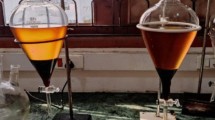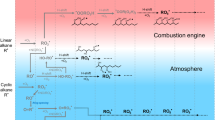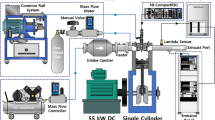Abstract
WORK on the effect of additives on the 'knock' -limited compression ratios of a wide variety of fuels has shown that there are at least two mechanisms whereby a fuel may 'knock'. One appears to correspond to the 'high' - and one to the 'low'-temperature ignition process discovered1 and thoroughly explored2 by Townend and his co-workers. Hydrocarbons such as benzene and methane, which Townend did not observe to give a 'low'-temperature ignition peninsula, 'knock' by the igh'-temperature process, and other hydrocarbons 'knock' by the 'low'-temperature process.
This is a preview of subscription content, access via your institution
Access options
Subscribe to this journal
Receive 51 print issues and online access
$199.00 per year
only $3.90 per issue
Buy this article
- Purchase on Springer Link
- Instant access to full article PDF
Prices may be subject to local taxes which are calculated during checkout
Similar content being viewed by others
References
Townend and Mandlekar, Proc. Roy. Soc., A, 141, 484 ( 1933).
See Newitt and Townend, "The Science of Petroleum", 4, 2884, 2958 ( 1938).
Chamberlain and Walsh, Symposium on Oxidation, Paris ( April 1948). Symposium on Combustion, Madison ( September 1948).
Townend, Chem. Rev., 21, 259 ( 1937).
Egerton, Smith and Ubbelohde, Phil. Trans. Roy. Soc., A, 234, 433 ( 1935).
Author information
Authors and Affiliations
Rights and permissions
About this article
Cite this article
DOWNS, D., WALSH, A. 'Knock' in Internal Combustion Engines. Nature 163, 370–371 (1949). https://doi.org/10.1038/163370a0
Issue Date:
DOI: https://doi.org/10.1038/163370a0
Comments
By submitting a comment you agree to abide by our Terms and Community Guidelines. If you find something abusive or that does not comply with our terms or guidelines please flag it as inappropriate.



